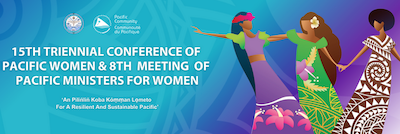Pacific leaders have been called on to innovative and be bold to create gender equality and respond to gaps which exist in their efforts to bridge differences.
Marshall Islands President Dr Hilda Heine said gender could not be addressed in isolation.
“We must think also of how it intersects with our other challenges and opportunities and develop our policies and approaches with gender equality in mind,” Heine said at the 15th Triennial Conference of Pacific Women in Majuro this week.

“Our gender equality journey calls on Pacific leadership to be intentional, innovative and bold in our responses to the gaps that we see in our efforts.
“We must take risks, create new partnerships, and be unwavering in our commitment to bring about substantive gender equality for the region.”
The triennial is the latest in a series which was first proposed in Port Moresby, Papua New Guinea, in 1974. Representatives from governments throughout the region are represented at the event which is followed by a meeting of Pacific ministers for women.
“We have come a long way in terms of advancing gender equality and the empowerment of women in the Pacific,” Heine said.
Forces that shape women
“Almost 50 years ago in 1975, 80 women from across the Pacific convened in Suva to talk about forces that shape women in society. ”
The initial meeting of 80 women identified family, culture and traditions, religion, education, media, law and politics as thematic areas which deserved attention and discussion.
Heine challenged Pacific women to extend their role as mothers who nurture and weave society towards nation building.
“A mother helps to nurture and weaves the society, therefore building a nation. That is our role. That is what we do. It is in our DNA,” Heine said.
“Current women leaders stand on the shoulders of those women who came before us, many had no clue about the PPA or what feminism is all about; yet their roles called for them to be involved and to push the boundaries; similarly, it is the responsibility of current women leaders to nurture and to mentor the next generation of women leaders, the leaders of tomorrow.”
Engage men and boys
A study across 31 countries has found that 60 percent of males aged 16-24 years believe that women’s equality discriminates against men.
“This finding is troubling and while the study did not include countries in the Pacific, it is important we take note of it and continue to look at ways to better engage men and boys in gender equality efforts in our part of the world,” Pacific Community’s Miles Young said.
Young said men and boys must be involved on a journey of understanding that gender equality benefited everyone.
“Noting the continuing relatively low representation of women across our national parliaments and at the highest levels of decision-making in the private sector, there may be an opportunity this week to discuss revitalising the conversation around affirmative action — or what some term temporary special measures,” he said.
He noted the presence of Tuvalu Prime Minister, Feleti Teo, Marshallese Women’s Minister, Jess Gasper, and United Nations Women Senior Adviser, Asger Rhyl, and “the many other men who are committed to gender equality”.
“There may be an opportunity for discussions around how to more effectively engage men and boys in progressing gender equality,” Young said.
Women make up 8.8 percent of parliamentarians (54 MPs) in the Pacific, up from 4.7 per cent (26 MPs) in 2013.
Young said the Pacific Community stood ready to collaborate with women representatives and development partners to support decisions and the outcomes of the meeting.
“This commitment reflects the highest priority which SPC attaches to supporting gender equality in the region.”
Netani Rika e is communications manager of the Pacific Conference of Churches and is in Majuro, Marshall Islands, covering the 15th Triennial Conference of Pacific Women.
This post was originally published on Asia Pacific Report.